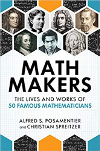- About MAA
- Membership
- MAA Publications
- Periodicals
- Blogs
- MAA Book Series
- MAA Press (an imprint of the AMS)
- MAA Notes
- MAA Reviews
- Mathematical Communication
- Information for Libraries
- Author Resources
- Advertise with MAA
- Meetings
- Competitions
- Programs
- Communities
- MAA Sections
- SIGMAA
- MAA Connect
- Students
- MAA Awards
- Awards Booklets
- Writing Awards
- Teaching Awards
- Service Awards
- Research Awards
- Lecture Awards
- Putnam Competition Individual and Team Winners
- D. E. Shaw Group AMC 8 Awards & Certificates
- Maryam Mirzakhani AMC 10 A Awards & Certificates
- Two Sigma AMC 10 B Awards & Certificates
- Jane Street AMC 12 A Awards & Certificates
- Akamai AMC 12 B Awards & Certificates
- High School Teachers
- News
You are here
Math Makers: The Lives and Works of 50 Famous Mathematicians

Publisher:
Prometheus
Publication Date:
2020
Number of Pages:
440
Format:
Hardcover
Price:
25
ISBN:
978-1633885202
Category:
General
[Reviewed by , on ]
Tom Schulte
02/23/2020
Fifty short biographies of mathematicians are here arranged chronologically by birth year. They range from Thales, supposedly the first Greek mathematician, to Maryam Mirzakhani, the first woman and the first Iranian to be awarded the Fields Medal. Written to be engaging and entertaining, the material is not dry like an encyclopedia entry or focused on expected facts like a Wikipedia article. These overviews are meant to interest a reader, particularly a young adult fostering an interest in mathematics.
“Understandable to readers with little math background,” there are no significant prerequisites to understanding the concepts detailed. These are kept pre-calculus, with a large amount of space given to advances in geometry and their illustration. Thales’s theorem has a proof with graphics. The very cursory summary of Mirzakhani’s work in topology includes the classic torus to mug transformation. Bernoulli numbers are something only “the ambitious reader will want to pursue.” Multiple historical techniques receive such a detailed examination, however, as to be suitable for classroom capsules. This includes Napier’s Bones, the manually-operated calculating device created by John Napier, and a few pages on Simpson’s rule as it applies to Kepler’s rule for determining the volume of barrels. In line with the emphasis on geometry, the only appendix is on Hilbert’s Axioms.
Certainly meant to inspire, the typical biography details why the subject is “honored” today. Building up to that for Isaac Newton, Sophie Germain, Emmy Noether and more are (at first) apparently discursive topics meant to frame the accomplishments under consideration. For Descartes, this means introductory paragraphs on circadian rhythm, while the lead into Abel is the Norwegian welfare state. The 1946 news of ENIAC sets the stage for considering Leibniz, while a rumination of fame introduces Goldbach. This approach makes for more interesting reading than each miniature biography leading off with place and date of birth.
Tom Schulte works from his Louisiana home as a software architect for Plex Systems.
The table of contents is not available.
- Log in to post comments




